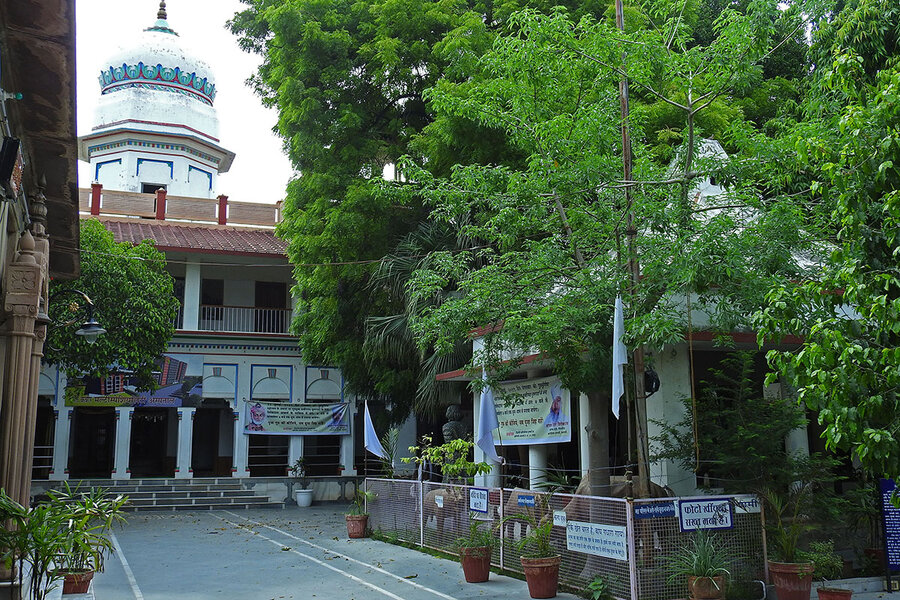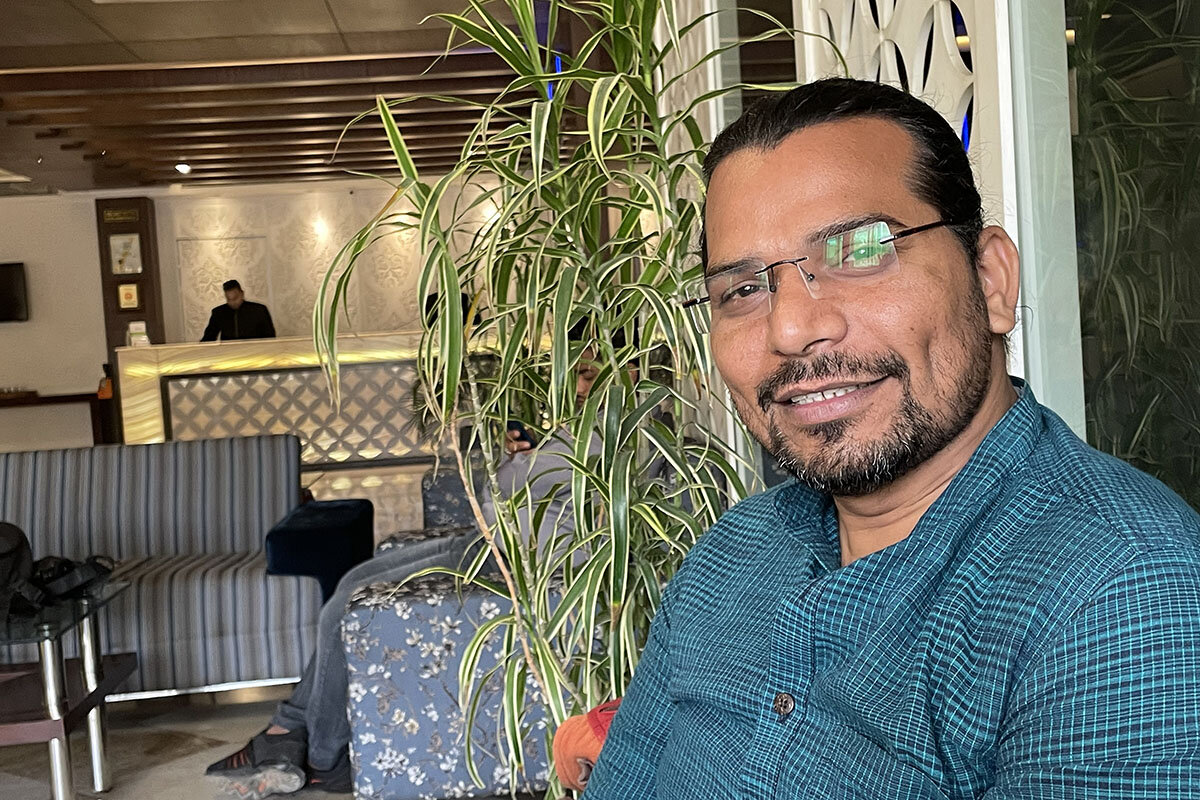As divisions deepen in India, a 15th-century poet inspires hope
Loading...
| Varanasi, India
The recent increase in hate crimes against religious minorities in India, particularly targeting Muslims, is prompting many Indians to worry about deteriorating communal bonds. Some are turning to a 15th-century mystic poet for hope and guidance.
Born, according to one legend, to a Hindu mother but raised by a Muslim couple, Kabir was equally scathing of both Muslim and Hindu orthodoxies and preached universal love in his poetry. While he faced persecution by leaders of both faiths, Kabir also inspired many during his lifetime. Legend says that when he died, as Hindus and Muslims fought over how to conduct final rites, his body was replaced with a bed of flowers, which a heavenly voice asked his followers to divide amongst themselves.
Today, his couplets about searching for wisdom and righteousness remain a common element of Hindu, Muslim, and even Sikh devotional songs. Visitors pay homage to Kabir at a shrine in the holy city of Varanasi, where the poet grew up, and also at a tomb a few hours north in Maghar, said to hold the remains of the poet.
Why We Wrote This
A story focused onAmid heightened religious divisions, some Indians find common ground in the life and teachings of a poet who helped bring Hindus and Muslims together 600 years ago.
His followers argue that his legacy has become even more poignant with the rise of Hindutva, a political ideology that seeks to establish Hindu hegemony in India. As hostility toward minorities rises, Kabir’s work highlights the subcontinent’s rich history of religious coexistence, and many academics, artists, and activists are using his words to express pride in India’s multicultural community.
Among them is Umesh Kabir, a Hindu scholar who was drawn as a teenager to Kabir’s love for humanity and later adopted the last name “Kabir.” Today, he performs Kabir’s poetry for a variety of audiences, including schoolchildren and people experiencing homelessness.
Through this work, “I have understood in a deeper way what it means to be a human,” he says, adding that devotion to Kabir means challenging any messages that spread fear or hatred toward minority communities.
After all, he says, “Kabir questions everything.”
Transcending religious lines
Kabir is one of the most prominent writers associated with the bhakti movement, a devotional movement that flourished in northern India from the 13th century to the 17th century. It promoted vernacular literature and challenged powerful socio-religious conventions, including caste.
Kabir’s poetry was so influential that the founder of Sikhism, Guru Nanak, incorporated it into the faith’s sacred scriptures.
Simranjit Singh, a Sikh who grew up hearing Kabir’s couplets, developed a deeper appreciation for the poet in graduate school.
“I found his ideas refreshing and provocative,” says the scholar. “His ability to share a profound idea with such brevity, and to do it in a way that resonates centuries later in a context he couldn’t even imagine, speaks to the depth of his wisdom.”
Kabir’s poems show “what it means to live among diversity,” he says. “That the Sikh Gurus included him as a sort of peer reminds us that one need not follow a single religious tradition in ... pursuit of enlightenment.”
Over the past decade, several Indian universities have organized events and lectures promoting communal harmony through Kabir’s poetry.
Banaras Hindu University in Varanasi held a conference late last month, where more than 30 speakers from India, Sri Lanka, and South Africa gathered to discuss devotional songs and poetry that have historically transcended religious divides. Kabir was front and center, along with other members of the bhakti movement.
BHU Dean Binda Paranjape says Kabir speaks to many young people who want to restore the country’s secular and inclusive ethos.
“The present-day situation in India is not comfortable for the younger generation,” she says. “They are really worried for their future. [There is communal] violence and economic uncertainty, and especially with the kind of challenges they are facing, Kabir gives a lot of hope to think beyond.”
Tool to address violence
In the northern state of Rajasthan, some law enforcement officials have partnered with folk singers to spread Kabir’s message of peace.
Gopal Singh Chauhan, founder of the traveling folk festival Rajasthan Kabir Yatra (which means “A Journey With Kabir”), began collaborating with police across the state in 2015, after an argument over conflicting religious processions in the town of Dungargarh erupted into mob violence.
His group has visited dozens of other towns since, using Kabir’s poetry to create a space where people from all classes, castes, and religions can engage in dialogue.
“If Kabir says something, then it resonates,” Mr. Chauhan says, which can help promote peace and lead to “a very transformative journey for people.”
Indeed, the power of Kabir’s poetry lies in his broad reach, say experts and devotees.
Dalpat Rajpurohit, a South Asia scholar who specializes in early Hindi literature at University of Texas at Austin, notes that conservative Hindus also express admiration for Kabir. During a holiday honoring Kabir’s birth in 2021, Prime Minister Narendra Modi praised the poet for inspiring “brotherhood and goodwill.”
“It’s very hard to negate Kabir, even for Hindu nationalists,” says Dr. Rajpurohit.
As such, Kabir’s poetry offers a useful language for discussing religious diversity, especially in times of intense social discord. Kabir may not have ended religious hostilities, Dr. Rajpurohit says, but his legacy of questioning religious orthodoxies keeps this discourse alive, and, along with it, hope for a more harmonious future.
Ganesh Shankar Chaturvedi, a social activist working on issues of preservation and education in Varanasi, feels this hope.
He is inspired by Kabir’s ability to see both sides of an issue, and to be equally critical of each. It’s a quality he strives for in his work, which does not discriminate on the basis of faith. Mr. Chaturvedi also says he relates more to Kabir’s humanist message than to the teachings of some fellow Hindus who fear their neighbors.
“Wherever there is love, where there is truth, where there is humanity ... there will be Kabir,” he says.






